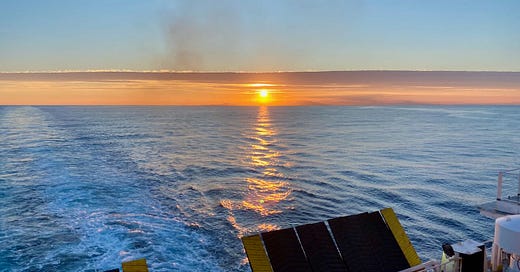Can't get much more solo than this
American sailor Cole Brauer circumnavigates the globe alone, a good-news story in a world with too many preventable marine disasters
The hardest part of travelling solo is when you’re no longer in motion. When you’re on the road, there’s plenty of planning to keep your mind busy and lots of opportunities to socialize. When you make a pit stop, tho, the stimuli stop.
That’s where I’m at right now. Looking forward—planning for the next few months—and looking back at where I’ve been and what I’ve learned in six months on the road.
I’ve met quite a few solo travellers along the way, some just on a few weeks holiday, others who’ve been on the road for years. But the most inspiring of the lot is a 29-year-old by the name of Cole Brauer, who today became the first American woman to sail non-stop and solo around the world.
I obviously didn’t meet her in the true sense of the word. She’s sailing single around the planet after all, not hopping from hostel to hostel across Europe. But as a member of Gen X, social media is part of her DNA, and so I was introduced to her about eight weeks ago in her Instagram feed as she was speeding in rough seas towards South America’s Cape Horn and I was just about to get on a slow ferry traversing a calm Mediterranean.
I suppose we were introduced by algorithms that connected my interest in solo travel with her intimidating adventure, so put her on my Instagram radar. I’ve been following her enthusiastically ever since.
Cole landed this morning just as I posted this, in A Coruña, Spain, the start and finish line of the solo challenge. As the youngest sailor in the race, that’s no small feat. More than half the original skippers had already bailed, and Cole has finished in second place.
She is the 17th woman to complete the race and one of just 200 sailors in the world to meet the non-stop challenge.
As I have watched Cole navigate around massive storm fronts, exhaust herself in a seemingly never-ending dance of sail changes to best harness fluctuating winds, and even get tossed around inside the boat as it was battered by waves, my own difficulties became trivial. Loneliness? Bah, Cole doesn’t even have birds for company most days, tho she stays in regular contact with her team via Starlink satellite. Missed connections? Ha. On the ocean, a mistake can’t be fixed with a new flight reservation, it can literally mean life or death.
Which reminded me once more of the dangers that so many migrants face on boats that, unlike Cole’s, aren’t designed with safety in mind but are more likely to be derelict fishing boats with inexperienced captains and way too many passengers, even in calm seas.
Coincidentally, just as Cole was nearing the Spanish coast, the UN’s International Organization for Migration announced that 2023 has been the worst year since they started tracking it for migrant deaths, most of them by drowning. At least 8,565 are confirmed dead (many deaths go unreported), including 3,129 in the Mediterranean, up from 2,411 in 2022. And like the sinking of the Adriana off the coast of Greece last June, many of these deaths were preventable.
I have to wonder, if we were able to follow the the journeys of all these invisible souls in Instagram reels, if we knew the conditions they were fleeing at home and could witness the risks they encountered on the road and on the seas, maybe we would welcome them like Cole as heroes when they landed, rather than as cheaters who had jumped the queue.
⚜ ⚜ ⚜
You may remember that the reason I took the ferry from Nador, Morocco, to Sète, France, in January was to try to understand, even if just for a brief moment, what that crossing entailed. Blessed with calm seas and a safe, modern ship, however, the only thing I experienced on those two days at seas was boredom and sleep that was interrupted by the constant movement of my fellow passengers.
And there was no wi-fi!
I had taken the “chair” option in the Pullman lounge area rather than a cabin, so I was constantly woken by the slamming of metal doors every time someone went out or returned from the deck. A few passengers didn’t even have the chairs and slept on the carpeted floors. The cabins were mostly taken by truckers whose cargo vans filled the lower decks and whose shouts filled the common areas as they took each other’s money over cards.
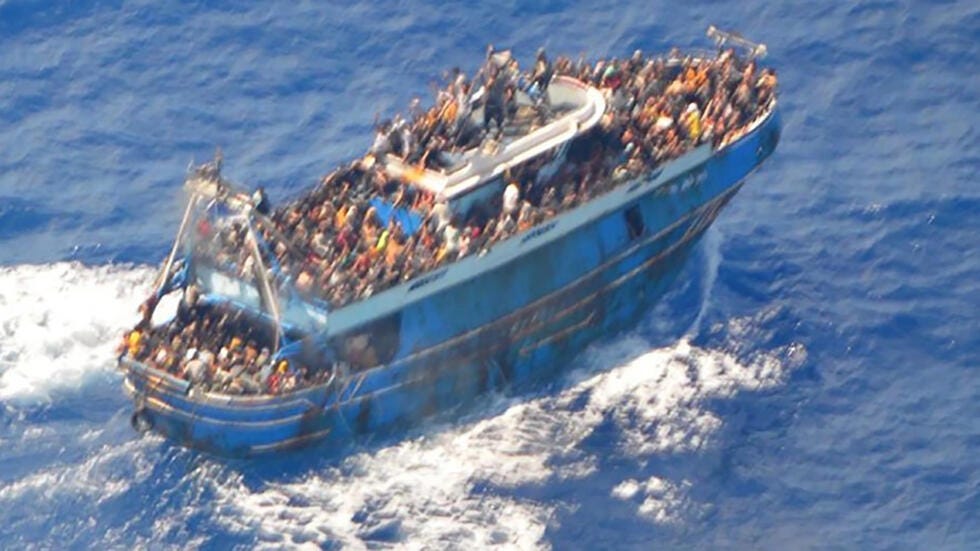
Uncomfortable, yes, but I knew that my sleeping conditions on the ship were luxurious compared to the cargo bays of fishing vessels that stank of previous loads and of the smells that flourish in cramped human quarters without proper toilets or showers, the sound of infants crying and children begging to go back home.
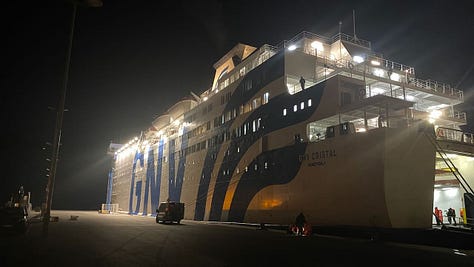
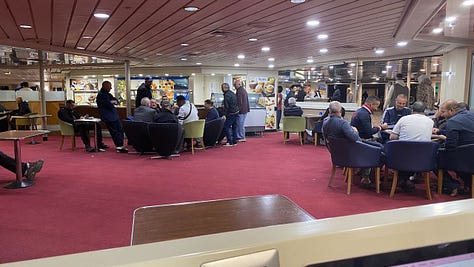
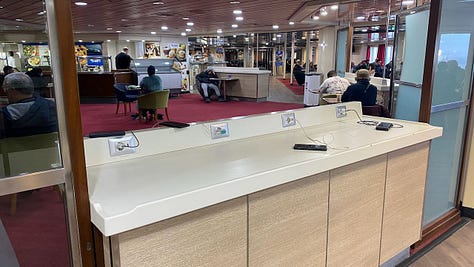
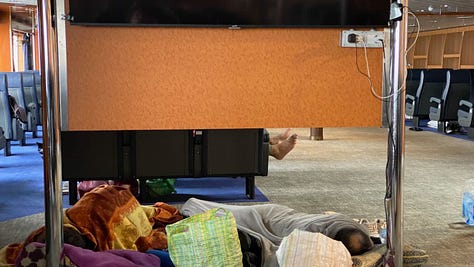
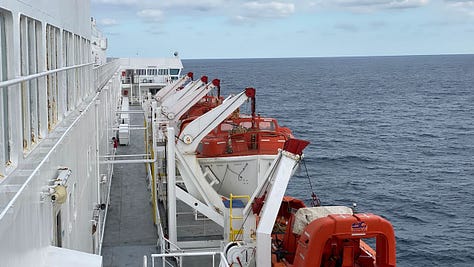
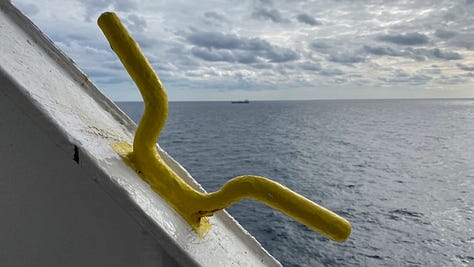
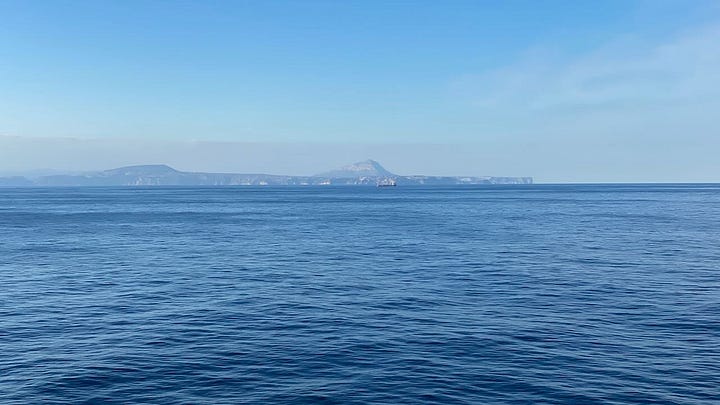
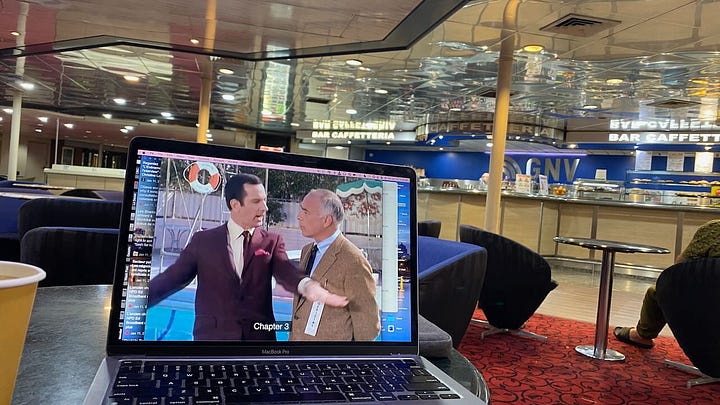
The only new thing my Mediterranean cruise revealed to me was the vastness of the sea and the tiny chance that a migrant would survive if they ever went overboard, their cries drowned out by the sound of waves and the engines growing ever distant.
Their cries drowned out by indifference and prejudice in the societies where they sought hope and by the greed of those who exploit their desperation.
⚜ ⚜ ⚜
Yes, that was quite a jump, from solo hero to migrant misery, but that’s the world we live in. The stories that catch our attention aren’t necessarily the most dramatic, they are the ones where we have hope that there will be a happy ending. Perhaps that’s why images of the bodies of migrant children washed ashore on a Turkish beach beach no longer shock us. We know they will not be the last. But what if there were fewer fatalities? What if we found better ways to help migrants stay in their communities, or helped them and their families move safely away from war and famine?
Wouldn’t that be a good-news story?
Let’s hope we’ll be reading that one soon.
Thanks for taking today’s sail with me. See you next week.


